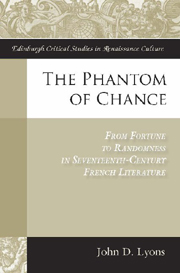Book contents
- Frontmatter
- Contents
- Preface: The Phantom of Chance
- Acknowledgements
- Series Editor's Preface
- Introduction
- 1 Fortune, Mistress of Events: Corneille and the Poetics of Tragedy
- 2 God in a World of Chance: Pascal's Pensées and Provincial Letters
- 3 From Chance Events to Implausible Actions: Lafayette and the Novel
- 4 The God of Suspense: Bossuet's Providential History and Racine's Athalie
- 5 An Accidental World: La Bruyère's Characters
- Conclusion
- Bibliography
- Index
2 - God in a World of Chance: Pascal's Pensées and Provincial Letters
Published online by Cambridge University Press: 12 September 2012
- Frontmatter
- Contents
- Preface: The Phantom of Chance
- Acknowledgements
- Series Editor's Preface
- Introduction
- 1 Fortune, Mistress of Events: Corneille and the Poetics of Tragedy
- 2 God in a World of Chance: Pascal's Pensées and Provincial Letters
- 3 From Chance Events to Implausible Actions: Lafayette and the Novel
- 4 The God of Suspense: Bossuet's Providential History and Racine's Athalie
- 5 An Accidental World: La Bruyère's Characters
- Conclusion
- Bibliography
- Index
Summary
The Random Human Condition
Whoever wants to know man's vanity fully has only to consider the causes and effects of love. The cause is a something I know not what. Corneille. And the effects are frightening. This something I know not what, so insignificant that we cannot recognize it, disturbs the whole earth, princes, armies, the entire world.
Pascal's cryptic comment on Cleopatra's nose is one of the best-known fragments of the Pensées. It conveys crisply the idea that a small, random factor can have enormous consequences. This factor may even be invisible to the people initially most concerned. Was Antony aware that it was the nose, or rather the particular length of the nose, that drew him irresistibly to this Egyptian queen? Presumably not, for the cause of love is a Je ne sais quoi. Love, in other words, happens by chance and is simply a moment within an infinite and imperceptible series of causes that could also be ascribed to chance and about which we can ask, in vain, ‘Why this nose?’ and ‘Why this moment?’
A similar fragment concerning a contemporary event appears elsewhere in Pascal's text:
Cromwell was about to ravage all Christendom, the royal family was lost, and his own established forever, save for a little grain of sand getting into his bladder. Even Rome was about to tremble under him. But this small piece of gravel having gotten there, he died, his family was debased, all is peaceful, and the king restored. (S. 622, p. 1161/185)
- Type
- Chapter
- Information
- The Phantom of ChanceFrom Fortune to Randomness in Seventeenth-Century French Literature, pp. 67 - 103Publisher: Edinburgh University PressPrint publication year: 2011



